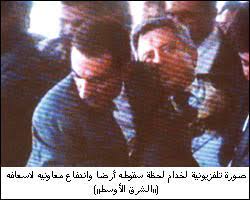We write this statement, reassured by the stable health condition of the Syrian Vice President, Mr. Abdul Halim Khaddam, based on the announcement made by the former Lebanese Minister of Health, Dr. Karam Karam. Dr. Karam’s report summarizes the matter as a result of gastric obstruction followed by vomiting. The congestion during the commemoration of the assassination of the martyr Rafik Hariri and the hot atmosphere surrounding the celebration contributed to “Abu Jamal” experiencing what he did. Additionally, it could be added that the “memories” of Abdul Halim Khaddam about the late President Rafik Hariri, or his Lebanese “memories” in general, contributed to his “fainting spell,” from which he woke up with his doctors announcing that his “heart condition” is healthy. This prompted further reassurance, as the Syrian Vice President had years ago undergone treatment at the American Hospital in Paris for health issues unrelated to heart health. The current incident affirmed that despite the Syrian Vice President’s withdrawal from involvement in Lebanese affairs for several years, Abdul Halim Khaddam’s eloquence and vitality remain intact when speaking about Lebanon and the generation he lived among, the men of Lebanon who could be described as “historical,” with the model of their “wise” being the martyr President Rafik Hariri. We can conclude that the “influence” of those memories was a significant factor in what afflicted Mr. Vice President of the Syrian Arab Republic, given the connection between the heart and the tongue, according to the specifications of the “wise poets” like Zuhair ibn Abi Salma. After emerging from the state of unconsciousness, it became clear that the connection between the tongue and the heart is not only a rhetorical connection but also a health-related one, as the doctors announced that the “integrity” of the heart is in harmony with the “integrity” of the tongue! One of the ironies of fate is that two Syrian figures who played a role with the great late President Hafez al-Assad and then with President Bashar in the “engineering” of Syrian politics and dealt with Lebanese affairs – though their involvement varied – both “visited” Lebanese hospitals during their engagement with Lebanese affairs. They are politically complementary, the former being the former Minister of Foreign Affairs and Vice President, Mr. Abdul Halim Khaddam, and the latter being the current Minister of Foreign Affairs, Mr. Farouk al-Shara. We do not claim that they experienced what they did as a result of “fatigue” due to the “difficulty” of the Lebanese political situation, but it is purely coincidental and a “common destiny” between them, a “common Lebanese-Syrian destiny” in particular!
As fate would have it, one of them entered the American Hospital in Paris, and the other entered the American Hospital in Beirut, confirming the separation between medicine and politics. It underscores that the Arab national politician does not hesitate to seek treatment in an American hospital, despite the sharp disagreement with U.S. policy. An American hospital in Lebanon, with French doctors and management, provides treatment to a politician who opposes U.S. policy and may even differ with French policy. Similarly, an American hospital in Beirut, with Lebanese doctors and management, delivers treatment to a politician who contradicts U.S. policy and some Lebanese policies.
Regarding Mr. Abdul Halim Khaddam specifically, who is fondly referred to as “Abu Jamal” by Lebanese politicians who have known him more than his Syrian colleagues, he is someone who informed them and was informed by them more than his peers in Syria. Despite his distance from the “Lebanese file,” his interactions with this file have left an indelible mark. Even though he has not been directly involved, his return to the Lebanese stage allows him to express his “Lebanese sentiments” with unparalleled eloquence, not just through rhetoric but through a state of exhaustion to the point of fainting. Is there a more powerful expression of his Syrian attachment to Lebanon than his collapse while speaking about one of Lebanon’s most enlightened political figures, whose Lebanese political career, intricately woven into Lebanon’s history, coexists with his deep Arab identity and belief in an uncomplicated relationship with his brothers?
Doesn’t what happened to Mr. Khaddam affirm the unity of Lebanese-Syrian destiny, not just as a collective but also as individuals?

